- Hospitality
- Land Transportation
- Travel Operators
- Marketplace
- Top Archaeological Sites
- Tourism Education
- Niche Markets
- Trade Associations – Gov – Org
- Greek Hotels Reopening
- The Day After
- Local Actions
- Investment News
- Thought Leaders 2023
- Business Talk
- Recruitments
- 2024 – International Women’s Day
- 2021 – International Women’s Day
- 2018 – International Women’s Day
- Northern Greece
- Calendar of events
- Greek Hospitality Awards
- Tourism Awards 2019
- ITB Berlin 2024 Special
- ITB Berlin 2023 Special
- ITB Berlin 2019 Special
- ITB Berlin 2018 Special
- ITB Berlin 2017 Special
- 100% Hotel Show
- Philoxenia 2014 Special
- WTM London 2023 Special
- WTM London 2022 Special
- WTM London 2019 Special
- WTM London 2018 Special
- WTM London 2017 Special
- GTP Careers in Tourism
- GTP Ferry Connections

New Covid-19 Rules: How Travelers Can Enter Greece
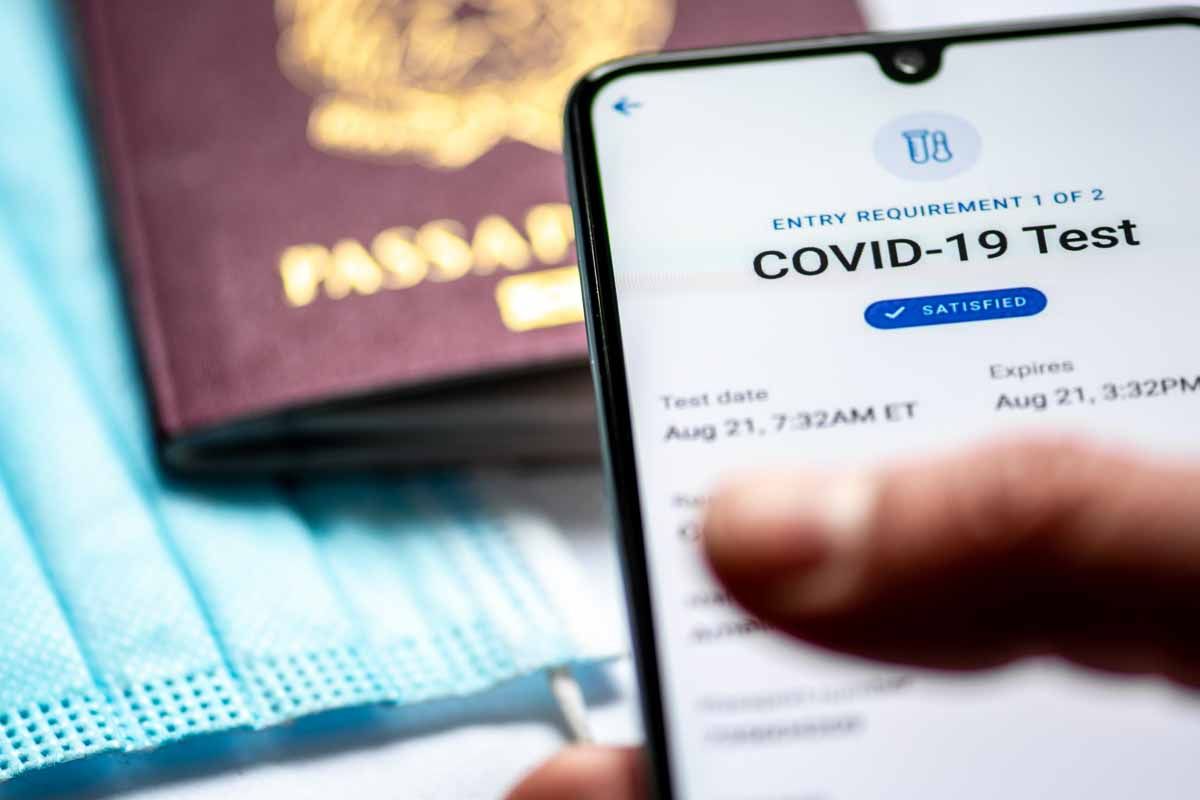
Photo source: Shutterstock
The new emergency rules that all international travelers must follow to enter Greece by air, boat, road and rail were published in the Greek Government Gazette on Friday.
According to the ministerial decision, as of 6am on Sunday, December 19, all inbound travelers, regardless of vaccination status, must present a negative PCR or rapid antigen test result taken before entering the country.
PCR tests should be performed within 72 hours before travel and rapid antigen tests should be performed within 24 hours before travel.
The rules will be in force until Monday, January 10, 2022, and are part of the Greek government’s efforts to curb the spread of the coronavirus (Covid-19) and the new Covid-19 variant, called Omicron in the country.
Following are the rules in detail:
Travel rules for international arrivals
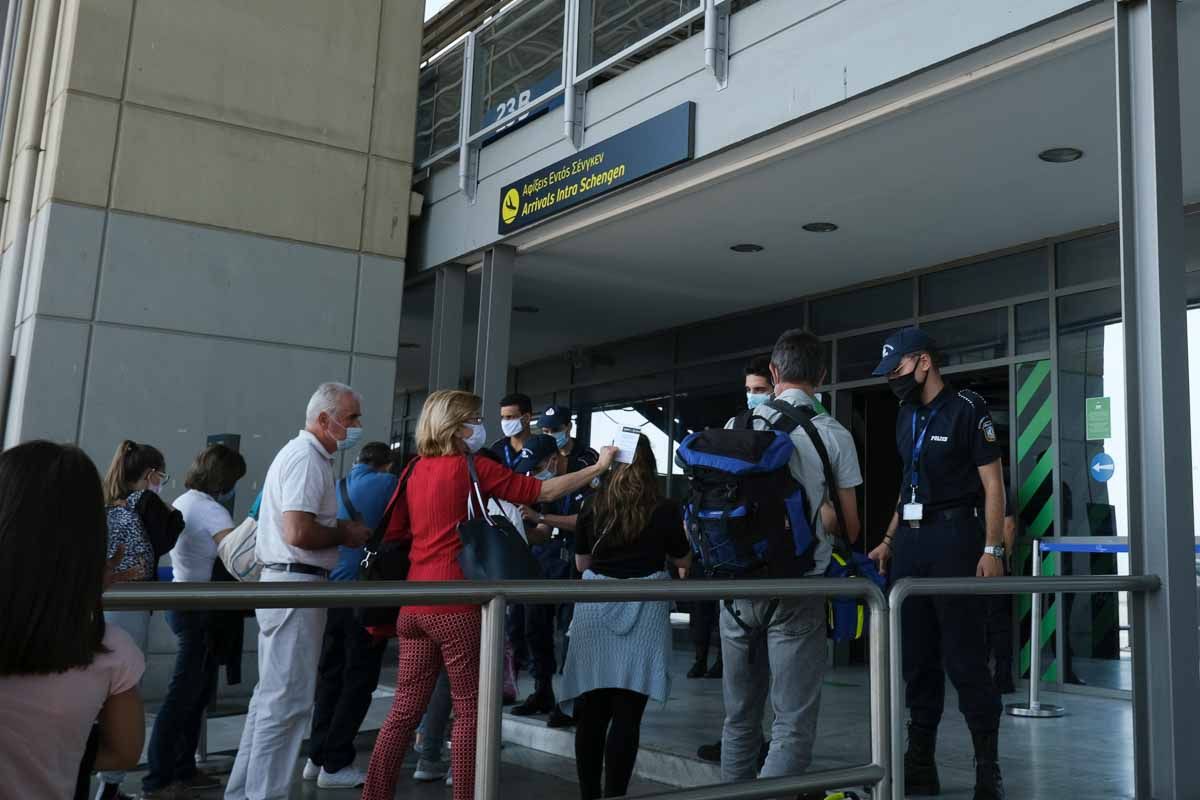
Who is allowed entry to Greece
Greece is open for travelers from all EU & Schengen Area countries and has a ban on travellers from non-EU countries.
However, people traveling for essential reasons and travelers from the following 42 non-EU countries and territories are allowed to enter Greece – provided they have the required documentation – without the requirement for subsequent self-isolation: Australia, Northern Macedonia, United Arab Emirates, United States of America, United Kingdom, Israel, Canada, Belarus, Bahrain, New Zealand, South Korea, Qatar, China, Kuwait, Ukraine, Russia, Saudi Arabia, Serbia, Singapore, Bosnia and Herzegovina, Montenegro, Albania, Japan, Lebanon, Azerbaijan, Armenia, Jordan, Moldova, Brunei, San Marino, Andorra, the Vatican, Monaco, Turkey, Mexico, Kosovo, Chinese Taipei, Argentina, India, Uruguay, Omman and Chile.
Entry requirements
Greece will allow entrance to travelers that have filled out the Passenger Locator Form (PLF) any time before the departure of their flight . The PLF is mandatory and must be filled out by all travelers, regardless of their nationality. The PLF can be found here .
Passengers from abroad, regardless of vaccination/recovery status, must also have one of the following :
– a negative PCR test performed within 72 hours before travel or – a negative rapid antigen test performed within 24 hours before travel.
Negative test results must be issued by an authorized laboratory and in one of the following languages: Greek, English, French, German, Italian, Spanish or Russian. The name on the vaccination certificate must match the name on the passport.
The rule is in force for children aged 5 and over.
Random rapid testing on arrival
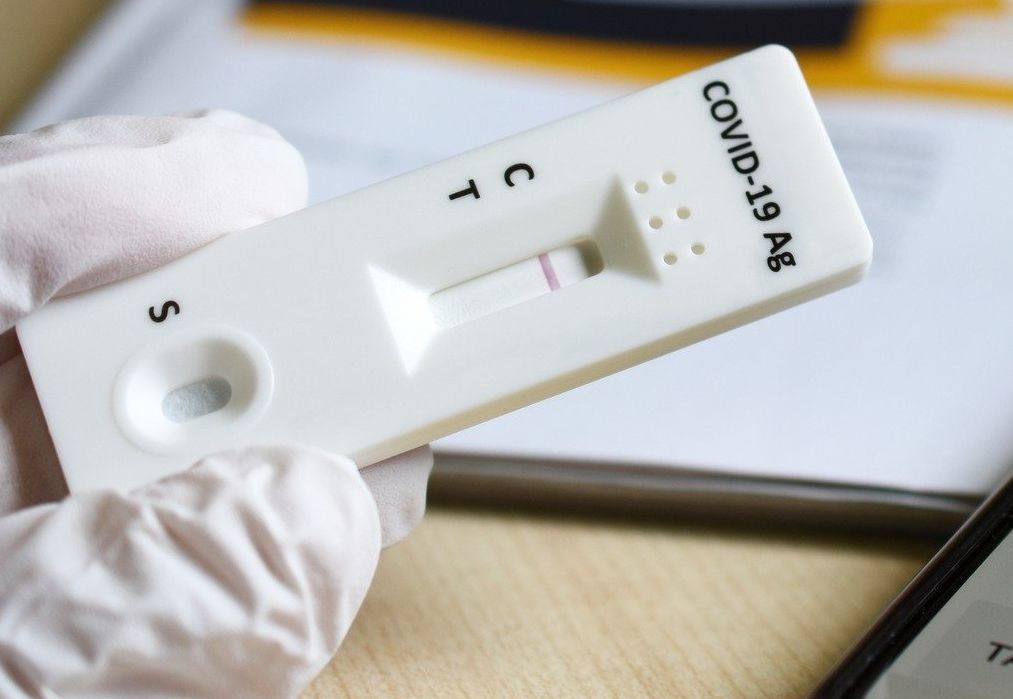
Every traveler who arrives in Greece, regardless of their vaccination/recovery status, may be requested to undergo a random health screening (depending on the data provided on the PLF forms and based on the ‘EVA’ system). If a passenger is selected for a rapid test and is positive for the coronavirus then he/she must quarantine for a total of:
– 7 days, if vaccinated against Covid-19 – 10 days, if unvaccinated
In both cases, passengers will have to take a PCR test on the last day of their quarantine. If the test is negative the mandatory quarantine ends.
Mandatory rapid testing on arrival for some travelers
Permanent residents of Argentina, India, Mexico, Uruguay, Russia, Omman and Chile must present the required documentation and also take a rapid or PCR test for Covid-19 (regardless if they are vaccinated or not) upon arrival to Greece. The rule is in force for children aged 5 and over. Travelers that test positive for Covid-19 will receive further instructions.
All travelers, regardless of nationality and means of transport to the country, from Egypt, Albania, Argentina, Bulgaria, Brazil, Georgia, Cuba, the United Arab Emirates, India, China, Libya, Morocco, North Macedonia, Pakistan, Russia and Turkey must present the required documentation and take a rapid or PCR test for Covid-19 upon arrival to Greece. Exempt from testing upon arrival are passengers from the aforementioned countries that have:
– a vaccination certificate , stating that 14 days have passed since full vaccination for Covid-19. Vaccination certificates must be issued by a public authority and in one of the following languages: Greek, English, French, German, Italian, Spanish or Russian. The name on the vaccination certificate must match the name on the passport and also include, the type of vaccine administered, the number of doses and the dates they were administered. The rule is in force for children aged 5 and over.
– a recovery certificate . Travelers can present a medical/recovery certificate issued thirty days after they first tested positive for Covid-19. The certificate is valid for entry to Greece 90 days after the first positive Covid-19 test result. The certificate must be issued by a public authority or a certified laboratory in one of the following languages: English, French, German, Italian, Spanish or Russian. The rule is in force for children aged 5 and over.
Travelers that test positive for Covid-19 will receive further instructions.
Strict entry rules for arrivals from Africa
All travelers, regardless of nationality and means of transport to the country, from South Africa, Botswana, Namibia, Lesotho, Zimbabwe, Mozambique, Eswatini, Zambia and Malawi , must present the required documentation and:
– take a rapid or PCR test for Covid-19 upon arrival to Greece – quarantine for 10 days in a quarantine hotel and then re-tested via the PCR method. Those who test negative will be released from quarantine.
Travelers in need of specific details on the travel rules for passengers of international flights are recommended to contact their embassy, airline or the General Secretariat for Civil Protection .
The Greek Government Gazette containing the rules all international travelers must follow to enter Greece can be found here .
- Join the 15,000+ travel executives who read our newsletter
About the Author
Greece aims for total tourism restart in 2022, says minister kikilias, stolen antiquities return to greece from the united states, add your comment cancel reply.
Save my name, email, and website in this browser for the next time I comment.

Join our Newsletter
Join our GTP Headlines free daily newsletter

Signup to receive our daily travel-tourism industry newsletter.
SUBSCRIBE TO RSS
Copyright notice.
The team | About GTP Headlines
Greek Travel Pages, 6, Psylla str. Athens GR 10557 Call center: +30 210 324 7511
Contact Details
Guest posts are welcome. Read the editorial guidelines here.
- KAYAK for Business NEW
Greece Travel Restrictions
Traveler's COVID-19 vaccination status
Traveling from the United States to Greece
Open for vaccinated visitors
COVID-19 testing
Not required
Not required for vaccinated visitors
Restaurants
Not required in public spaces and public transportation.
Greece entry details and exceptions
Ready to travel, find flights to greece, find stays in greece, explore more countries on travel restrictions map, destinations you can travel to now, dominican republic, netherlands, philippines, puerto rico, switzerland, united arab emirates, united kingdom, know when to go.
Sign up for email alerts as countries begin to open - choose the destinations you're interested in so you're in the know.
Can I travel to Greece from the United States?
Most visitors from the United States, regardless of vaccination status, can enter Greece.
Can I travel to Greece if I am vaccinated?
Fully vaccinated visitors from the United States can enter Greece without restrictions.
Can I travel to Greece without being vaccinated?
Unvaccinated visitors from the United States can enter Greece without restrictions.
Do I need a COVID test to enter Greece?
Visitors from the United States are not required to present a negative COVID-19 PCR test or antigen result upon entering Greece.
Can I travel to Greece without quarantine?
Travelers from the United States are not required to quarantine.
Do I need to wear a mask in Greece?
Mask usage in Greece is not required in public spaces and public transportation.
Are the restaurants and bars open in Greece?
Restaurants in Greece are open. Bars in Greece are .
Greece moves ahead with dropping entry restrictions on May 1

Apr 29, 2022 • 3 min read

Greece is lifting entry restrictions on May 1 © valentinrussanov/Getty Images
Will they? Won't they? Yes they will! After much back-and-forth, Greek authorities have confirmed today that entry restrictions will be dropped on Monday, May 1.
A spokesperson from Marketing Greece — one of Greece 's major tourism organizations — confirmed to Lonely Planet that tests, vaccination or recovery certificate will no longer be required for entry from next week. It follows a reccomendation from the Committee of Health Experts that was adopted by the government on April 28.
From May 1, visitors will also enjoy full access to museums, archaeological sites, restaurants and other culture and entertainment venues for which vaccination or recovery certificates were previously required.
"Greece was one of the first countries to establish a series of health and safety measures in the hospitality sector that guaranteed a safe environment for those who chose our country for their holidays. This has paid off with the trust of millions of travellers that enjoyed their long-awaited time in Greece," said Greece’s Minister of Tourism, Vassilis Kikilias.
"This season, that has already started, is an opportunity for a less logistically and stress-free prior-to-arrival procedure but equally safe journey to witness Greek hospitality, explore new destinations and discover your next favourite spot in the country."

The news was given a false start earlier this month when Greece's Health Minister Thanos Plevris said at a press conference that authorities would suspend COVID-19 protection measures in May.
He was referring to the suspension of COVID passes required for entry to certain public venues in Greece, but his comments were misinterpreted arcoss various media reports to include all certificates, including those required for entry to the country—a decision that hadn't yet been reached.
Now, travelers who are planning to travel to Greece this summer can be assured that they no longer have to present any COVID certificates to enter the country or to enter venues like restaurants, bars, museums and cafes.
Mask wearing is still required indoors but that mandate will be lifted on June 1.
If you're planning on traveling to Greece, here's what you need to know about the latest requirements.
10 incredible Greek hiking trails you can tackle right now
Entry requirements for Greece until May 1
Currently, those who hold a valid European Union digital COVID-19 certificate do not need to present proof of a negative pre-arrival COVID-19 test. This includes travelers from the EU and Schengen zone as well as 33 other non-EU destinations that have joined the EU digital COVID Certificate system.
Travelers from Australia, Canada and the United States can also enter by showing one of the following: proof of vaccination, proof of recovery from the virus or a negative COVID-19 PCR test administered 72 before departure or a negative antigen test administered no more than 24 hours prior to departure.
Visitors from all other countries, including children over the age of five, need to present proof of a negative COVID-19 PCR test administered 72 before departure or a negative antigen test administered no more than 24 hours prior to departure.
These requirements will be dropped on May 1.

Proof of vaccination required to enter some venues until May 1
Some spaces, like enclosed eating areas, entertainment facilities (cinemas, theaters), museums, exhibition centers, fitness centers and sports venues, require proof of vaccination to enter.
This rule will be suspended on May 1.
Face masks continue to be required
Greece still requires masks indoors until June 1 so tuck one in your pocket. On public transportation, you'll need to double mask or wear a high-quality mask (such as an N95/FFP2). You can be fined for not wearing one. Taxis are limited to three people in addition to the driver unless they are carrying members of the same family.
You may also like: France's travel rules have changed again as restrictions are dropped for UK visitors Wish you could work from Italy? You might soon with this new digital nomad visa Traveling to the Canary or Balearic islands in Spain? Here’s what to expect
This article was first published February 2022 and updated April 2022
Explore related stories
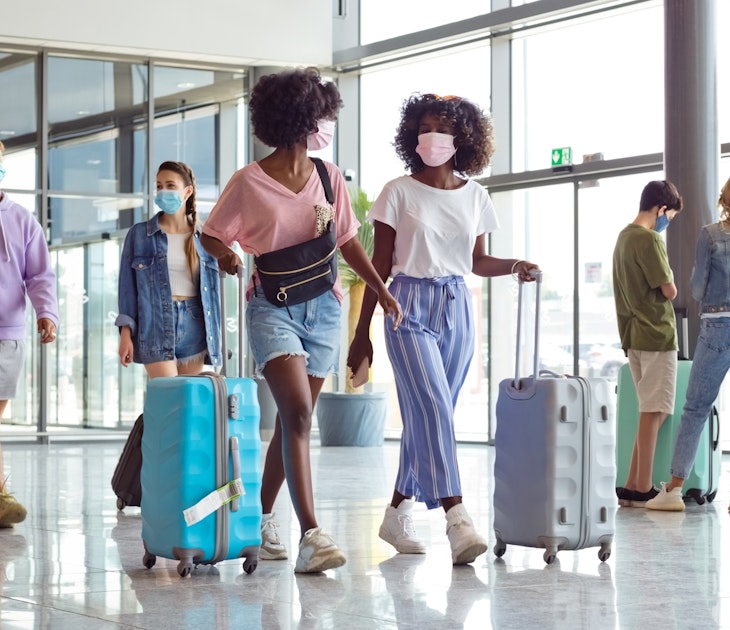
May 16, 2022 • 4 min read
The policy changes on May 16, but there are still many countries who require passengers to keep masks on during flights.

May 4, 2022 • 1 min read

Apr 8, 2022 • 4 min read
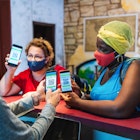
Mar 2, 2022 • 6 min read

Feb 14, 2022 • 2 min read

Feb 3, 2022 • 3 min read
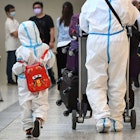
Nov 30, 2021 • 6 min read

Nov 29, 2021 • 6 min read

Aug 25, 2021 • 4 min read

Mar 15, 2024 • 10 min read
Greece Covid-19: Travel Updates
Last update: May 3rd, 2022 Disclaimer: The following information is subject to future short notice changes & updates. From May 1st 2022 and as long as the epidemiological data allow so , travelers of all ages are no longer requested to demonstrate any COVID19-related document .
GENERAL GREECE COVID-19 INFORMATION
Important Note: Covid-19 protocols for traveling to and in Greece are suspended ! • From May 1st, 2022 onwards, travellers visiting Greece, regardless of the country of origin, are no longer requested to demonstrate a vaccination certificate, a Covid-19 test or a proof of recovery. • From March 15th, 2022 onwards, travellers visiting Greece are no longer required to fill out the Passenger Locator Form (PLF). For more information, please consult: https://travel.gov.gr/#/ .
TRAVELLING BY FERRY
To travel by ferry in Greece and the Greek island s: • A vaccination certificate or, proof of Covid-19 recovery , or a negative covid test result is not necessary . • Face masks (FFP2 or N95) are obligatory in all interior and exterior areas of the ferry. If you do not wear a mask you will not be allowed to board the ferry. Exception: Only passengers who are not allowed to wear masks due medical reasons with according proof and children under 4 years old will be allowed to board without wearing a mask. To travel by ferry from Greece to Italy , all passengers more than 6 years old need to have one of the following certificates: • A full vaccination certificate issued by a certified authority, carried out less than 9 months ago, (EU Digital Certification or equivalent certification for the Italian authorities) OR • A PCR test of less than 72 hours OR • A Rapid Antigen test of less than 48 hours OR • An official proof of COVID-19 recovery which is valid on the trip date, not more than 6 months should have passed after the first positive test result, (EU Digital Certification or equivalent certification for the Italian authorities). Do you need to make a test in Athens or the Greek islands? Find out the laboratories & medical centers located in popular destinations.
DISCOVER MORE ABOUT GREECE

- Share this page on Facebook
- Share this page on Twitter
- Copy the URL of this page
Accessibility Links

Can I travel to Greece? The Covid entry requirements explained
Rules have been relaxed in greece but masks are still required in some settings.

H ot weather is probably the first thing on your list if you’re craving a trip to the Med, but Greece offers much more than that. With some 3,000 islands scattered around the Mediterranean sea — about 100 of which are inhabited — you’re bound to find one to suit your needs. And that’s not forgetting the mainland, with its dynamic cities, classical ruins and hidden mountain regions. Here’s what you need to know about the entry requirements for Greece and the best things to do when you’re there.
Main photo: Santorini, Greece (Getty Images)
What are Greece’s entry requirements?
All Covid-related travel restrictions were dropped in May 2022. It means British travellers no longer need to show any proof of vaccination or negative Covid tests, regardless of vaccination status . You don’t have to fill in a passenger locator form either.
However, since Brexit, passport validity rules have changed. If you’re travelling to Greece on a British passport, you must ensure your travel document is less than ten years old when you enter the country and is valid for at three months after the day you plan to leave. More details here .
What are the rules once there?
It’s still a legal requirement to wear masks on public transport. This also applies to taxis and indoor spaces on boats. In most other touristic settings (unless you need to visit a hospital or pharmacy) you won’t need to wear a mask.
Advertisement
Get inspired.
• Greece travel guide • Best hotels in Santorini • Best family hotels in Greece • Best all-inclusive hotels in Greece • Best villas in Greece • Best villas in Mykonos
Additional reporting by Qin Xie.
Take me there
Inspired to visit Greece but yet to book your trip? Here are the best packages from Expedia and BA Holidays .
Sign up for the Times Travel Newsletter here .
Related articles

Update April 12, 2024
Information for u.s. citizens in the middle east.
- Travel Advisories |
- Contact Us |
- MyTravelGov |
Find U.S. Embassies & Consulates
Travel.state.gov, congressional liaison, special issuance agency, u.s. passports, international travel, intercountry adoption, international parental child abduction, records and authentications, popular links, travel advisories, mytravelgov, stay connected, legal resources, legal information, info for u.s. law enforcement, replace or certify documents.
Share this page:
Greece Travel Advisory
Travel advisory july 26, 2023, greece - level 1: exercise normal precautions.
Reissued with obsolete COVID-19 page links removed.
Exercise normal precautions in Greece.
Read the country information page for additional information on travel to Greece.
If you decide to travel to Greece:
- Enroll in the Smart Traveler Enrollment Program ( STEP ) to receive security messages and make it easier to locate you in an emergency.
- Follow the Department of State on Facebook and Twitter .
- Review the Country Security Report for Greece.
- Visit the CDC page for the latest Travel Health Information related to your travel.
- Prepare a contingency plan for emergency situations. Review the Traveler’s Checklist .
Travel Advisory Levels
Assistance for u.s. citizens, search for travel advisories, external link.
You are about to leave travel.state.gov for an external website that is not maintained by the U.S. Department of State.
Links to external websites are provided as a convenience and should not be construed as an endorsement by the U.S. Department of State of the views or products contained therein. If you wish to remain on travel.state.gov, click the "cancel" message.
You are about to visit:
Cookies on GOV.UK
We use some essential cookies to make this website work.
We’d like to set additional cookies to understand how you use GOV.UK, remember your settings and improve government services.
We also use cookies set by other sites to help us deliver content from their services.
You have accepted additional cookies. You can change your cookie settings at any time.
You have rejected additional cookies. You can change your cookie settings at any time.
- Passports, travel and living abroad
- Travel abroad
- Foreign travel advice
Warnings and insurance
The Foreign, Commonwealth & Development Office ( FCDO ) provides advice about risks of travel to help British nationals make informed decisions. Find out more about FCDO travel advice .
Before you travel
No travel can be guaranteed safe. Read all the advice in this guide as well as support for British nationals abroad which includes:
- advice on preparing for travel abroad and reducing risks
- information for women, LGBT+ and disabled travellers
Follow and contact FCDO travel on X (formerly known as Twitter), Facebook and Instagram . You can also sign up to get email notifications when this advice is updated.
Travel insurance
If you choose to travel, research your destinations and get appropriate travel insurance . Insurance should cover your itinerary, planned activities and expenses in an emergency.

Related content
Is this page useful.
- Yes this page is useful
- No this page is not useful
Help us improve GOV.UK
Don’t include personal or financial information like your National Insurance number or credit card details.
To help us improve GOV.UK, we’d like to know more about your visit today. We’ll send you a link to a feedback form. It will take only 2 minutes to fill in. Don’t worry we won’t send you spam or share your email address with anyone.
TRAVEL SUPPORT
Travel requirements by destination
All destinations.

Afghanistan
Covid-19 testing requirements.
All passengers above the age of 8 years old are required to hold a negative COVID-19 PCR test conducted maximum 96 hours prior to departure.
Travel to and from Dubai
If you're travelling to, from or transiting through Dubai, please check our Travel requirements for Dubai. (Opens page in the same tab)
List of laboratories
This is a recommended list of authorised COVID-19 test laboratories in Dubai (Opens a PDF in a new tab) where you can get tested before you travel to your destination.
The UAE government has specified designated laboratories in each of our current destinations (Opens a PDF in a new tab) . You can either use the recommended laboratories in the list or any trusted and certified laboratories in your country of origin to get your COVID-19 RT PCR test.
Search and book flights

Latest updates
All restrictions lifted starting 01 November 2022
Mask requirements
Masks are required on board and at the airport in your destination.
The UAE government has specified designated laboratories in each of our current destinations (Opens a PDF in a new tab) . You can either use the recommended laboratories in the list or any trusted and certified laboratories in your country of origin to get your COVID-19 RT-PCR test.
If you're travelling to, from or transiting through Dubai, please check our Travel requirements for Dubai (Opens page in the same tab) .

There are no longer any COVID-19 entry restrictions for travel to Angola. This includes requirements for testing, vaccination, quarantine and entry forms.
Travel from Angola
Passengers are advised to ensure they meet all travel requirements for the countries of their final/transit destinations.
If you're traveling to, from or transiting through Dubai, please check our Travel requirements for Dubai (Opens page in the same tab) .

Travel eligibility
Travel from argentina.
This is a recommended list of authorised COVID‑19 test laboratories in Dubai (Opens a PDF in a new tab) where you can get tested before you travel to your destination.
The UAE government has specified designated laboratories (Opens a PDF in a new tab) in each of our current destinations. You can either use the recommended laboratories in the list or any trusted and certified laboratories in your country of origin to get your COVID‑19 RT PCR test..

There are no longer any COVID-19 entry restrictions for travel to Australia. This includes requirements for testing, vaccination, quarantine and entry forms.

There are no longer any COVID-19 entry restrictions for travel to Austria. This includes requirements for testing, vaccination, quarantine and entry forms.

There are no longer any COVID-19 entry restrictions for travel to Bahrain. This includes requirements for testing, vaccination, quarantine and entry forms.

There are changes to the required documents for travel to Bangladesh.
Masks are required on board and in the airport at your destination.
Visa-on-arrival services for nationals of the following countries are now available at Shahjalal International Airport in Dhaka:
- United States of America
- All GCC countries
- All European countries
New Zealand
- Russian Federation
- South Korea
Read through the guideline for all arriving passengers on the Civil Aviation Authority of Bangladesh portal (Opens an external website in a new tab) .
Passengers who are not fully vaccinated must have a negative COVID-19 RT-PCR test certificate for a test taken within 72 hours before departure.
Children under 12 years old are exempt from the COVID-19 PCR test requirement but must follow the requirements that apply to their accompanying family members.
Please refer to the Vaccination requirements section for more details.
Vaccination requirements
Vaccinated passengers
Travelers who have received the required doses (single/double dose) of a WHO-approved COVID-19 vaccine and carry a valid vaccination certificate are not required to present a pre-departure COVID-19 test certificate to enter Bangladesh.
Unvaccinated passengers
Travelers who have not received the required doses (single/double dose) of a COVID-19 vaccine must present a COVID-19 RT-PCR test certificate for a test taken within 72 hours before departure.
Required documents
The Online Health Declaration Form (HDF) is no longer required for travel to Bangladesh.
Travel from Bangladesh
Passengers must follow the COVID-19 PCR testing requirements of their destination and present the test result certificate at check-in. The COVID-19 PCR test certificate must be issued by approved hospitals or organizations (Opens a PDF in a new tab) .
This is a recommended list of authorized COVID-19 test laboratories in Dubai (Opens a PDF in a new tab) where you can get tested before you travel to your destination.
The UAE government has specified designated laboratories (Opens a PDF in a new tab) . You can either use the recommended laboratories in the list or any trusted and certified laboratories in your country of origin to get your COVID-19 RT PCR test.

There are no longer any COVID-19 entry restrictions for travel to Belgium. This includes requirements for testing, vaccination, quarantine and entry forms.

There are no longer any COVID‑19 entry restrictions for travel to Brazil. This includes requirements for testing, vaccination, quarantine and entry forms.

Before you travel, please ensure you understand the requirements for travel to Canada (Opens an external website in a new tab) .
While travelers will no longer have to submit their quarantine and vaccination information through ArriveCAN, they can continue to use the optional Advance Declaration feature in ArriveCAN (free as a mobile app or on the Canada Border Services Agency (CBSA) website) to save time at the airport by submitting their customs and immigration declaration in advance of arrival.
Download the ArriveCAN app here (Opens an external website in a new tab) .
Travel from Canada
If you're traveling to or transiting through Dubai, please check the travel requirements for Dubai , the requirements of your final destination, and the departure requirements below set by the Canadian government.

There are no longer any COVID‑19 entry restrictions for travel to China. This includes requirements for testing, vaccination, quarantine and entry forms.

Côte d'Ivoire (Ivory Coast)
From 7 March 2022, fully vaccinated passengers are not required to take a pre departure COVID 19 test for travel to Cote d’Ivoire.
Passengers who are not fully vaccinated, except children under below 12 years old, travelling to Abidjan from any country must have a valid printed negative COVID-19 PCR test certificate for a test taken not more than 72 hours before arrival. A certificate from any government approved laboratory is acceptable.
All arriving passengers are required to undergo a free COVID-19 antigen testing upon arrival.
Travel from Cote d’Ivoire
All departing passengers who require a COVID-19 PCR test for their final destination must conduct the test at a government designated laboratory. From 20 September 2021 the COVID‑19 PCR certificate must include a QR code.
The COVID-19 test cost is 25,000 FCFA payable online.
Passengers travelling from Abidjan must take the required pre-departure tests at designated testing centres approved by Institute Pasteur.

There are no longer any COVID-19 entry restrictions for travel to Cyprus. This includes requirements for testing, vaccination, quarantine and entry forms.
Wearing face masks is recommended on all flights to and from Cyprus, as well in all indoor areas while in Cyprus.

Czech Republic
There are no longer any COVID-19 entry restrictions for travel to Czech Republic. This includes requirements for testing, vaccination, quarantine and entry forms.

There are no longer any COVID-19 entry restrictions for travel to Denmark. This includes requirements for testing, vaccination, quarantine and entry forms.

Travel rules for Dubai residents
Follow the latest travel advice for residents travelling to and from Dubai (Opens page in the same tab) . The information changes frequently so please check back before you travel.
Travel rules for tourists
Follow the latest travel advice for tourists travelling to, through and from Dubai (Opens page in the same tab) . The information changes frequently so please check back before you travel.

There are no longer any COVID-19 entry restrictions for travel to Egypt. Passengers are no longer required to hold a COVID 19 vaccination certificate or a COVID 19 test result to enter the country. Quarantine restrictions have also been lifted.

There are no longer any COVID‑19 entry restrictions for travel to Ethiopia.
Visa-on-arrival services are available for eligible passengers provided they apply for OK-to-board approval before traveling to Ethiopia.
Exemptions:
- Transfer passengers
- Passengers with sticker visas
- E-visas with a confirmation page showing the passenger details along with a photo of the passenger will be accepted
- A visa on arrival will only be granted to passengers who were born in Ethiopia, whose passport states Ethiopia as their place of birth
- Children of Ethiopian nationals or Residence Card holders who are traveling with their parents, who will be allowed to enter the country with a visa on arrival eligibility or if they have a pre-issued sticker or e-visa
- Passengers with Africa Union IDs or Diplomatic IDs issued by the Ethiopian Ministry of Foreign Affairs, given the ID is valid
- Passengers with Ethiopian Origin ID

There are no longer any COVID-19 entry restrictions for travel to France. This includes requirements for testing, vaccination, quarantine and entry forms.

There are no longer any COVID-19 entry restrictions for travel to Germany. This includes requirements for testing, vaccination, quarantine and entry forms.

Travel from Ghana

There are no longer any COVID-19 entry restrictions for travel to Greece. This includes requirements for testing, vaccination, quarantine and entry forms.

From 25 June 2022, arriving and departing passengers will no longer be required to complete a health declaration form.
From 13 March 2022, all nationalities are allowed entry into Guinea provided they complete the following requirements on arrival.
Passengers who are fully vaccinated must present proof that they have complete the required doses of the any of the following vaccines:
- Astra Zeneca
- Sinopharm and Sinovac
- Johnson & Johnson
Fully vaccinated passengers are not required to present a negative pre-departure COVID-19 test.
Passengers unvaccinated or partially vaccinated must present a negative COVID-19 PCR test certificate for a test taken not more than 72 hours before travel.
Travellers who present a COVID-19 recovery certificate dated less than six months are not required to present a vaccination certificate on arrival.
Passengers between the ages of 5 and 18 years are exempt from the vaccination requirement but must take a PCR test not more than 72 hours before entry into Conakry.
Any passenger who presents symptoms of COVID 19 (e.g. fever, cough, difficulty breathing, sneezing, poor general condition, etc.) on arrival will undergo a standard diagnostic test (PCR) and be isolated while waiting for the test results. If found positive for COVID 19, the traveller will be treated at a dedicated processing centre.

Hong Kong, China
Effective March 1, 2023, travelers are no longer required to wear masks on board flights to Hong Kong and at Hong Kong International Airport.
Please visit the official website (Opens an external website in a new tab) for more details.
Please check the government website for eligibility and mandatory quarantine requirements before you travel to Hong Kong.

There are no longer any COVID-19 entry restrictions for travel to Hungary. This includes requirements for testing, vaccination, quarantine and entry forms.

Effective February 13, 2023 (11:00 a.m. IST), travelers may be subject to random COVID-19 PCR testing on arrival in India.
Effective February 13, 2023 (IST 11:00 a.m.), pre-departure COVID-19 testing and registration on the Air Suvidha portal are no longer required for passengers traveling from China, Hong Kong, Japan, Republic of Korea, Singapore and Thailand.
However, all travelers arriving in India are subject to random COVID-19 testing on arrival at the airport.

Vaccination and Satu Sehat Apps are no longer mandatory requirements.
Masks are optional on board and at the airport in your destination.
The following categories of passengers are exempt from the entry restriction:
- Indonesian nationals
- Non-Indonesian nationals holding diplomatic visa and official visa
- Non-Indonesian nationals holding limited stay permit (ITAS) and permanent stay permit (ITAP)
- Non-Indonesian nationals holding diplomatic stay permit and official stay permit
- Non-Indonesian nationals holding visit visas
- Non-Indonesian nationals holding limited stay visas
- Non-Indonesian nationals holding Asia Pacific Economic Cooperation (APEC) business travel card
- Foreign nationals from 92 territories who are eligible for visa on arrival services and who are visiting Indonesia for tourism purposes
International to international transit/transfer through Jakarta (CGK) airport is now allowed for a maximum of 6 hours. International to domestic transfer is allowed and travelers must present all entry requirements at the first port of entry.
International to international transit or transfer through Denpasar (DPS) airport is now allowed for a maximum of eight hours. Between 2:00 a.m. -7:00 p.m. (LT), the airport closure period, international to international transit or transfer passengers must clear CIQ and must fulfill DPS entry requirements.
Visa-free entry or visa on arrival is only allowed through CGK, DPS, KNO, SUB, UPG, MDC, YIA, BTH, LOP, PDG, BPN, PKU, KJT, DJJ and BTJ.
Visa-free entry for tourists only applies to citizens of South East Asian countries: Brunei Darussalam, Cambodia, Laos, Malaysia, Myanmar, Philippines, Singapore, Thailand, Timor-Leste and Vietnam.
Visa on arrival for tourists only applies to nationals of 92 territories: Albania, Andorra, Argentina, Australia, Austria, Bahrain, Belarus, Belgium, Bosnia Herzegovina, Brazil, Brunei Darussalam, Bulgaria, Cambodia, Canada, Chile, China, Colombia, Croatia, Cyprus, Czech Republic, Denmark, Ecuador, Egypt, Estonia, Finland, France, Germany, Greece, Guatemala, Hong Kong SAR, Hungary, Iceland, India, Ireland Republic, Italy, Japan, Jordan, Kazakhstan, Kenya, Kuwait, Laos, Latvia, Liechtenstein, Lithuania, Luxembourg, Macau SAR, Malaysia, Maldives, Malta, Monaco, Mexico, Morocco, Myanmar, Netherlands, New Zealand, Norway, Oman, Palestine, Panama, Peru, Philippines, Poland, Portugal, Qatar, Russia, Romania, Rwanda, Saudi Arabia, San Marino, Seychelles, Serbia, Singapore, Slovakia, Slovenia, South Africa, South Korea, Spain, Suriname, Sweden, Switzerland, Taiwan, Thailand, Timor-Leste, Tunisia, Turkey, Ukraine, United Arab Emirates, United Kingdom (British citizens only), United States of America, Uzbekistan, Vatican and Vietnam.
Passengers who have the following types of British passports are not eligible for visa on arrival services:
- British Overseas Territories Citizen
- British National (Overseas)
- British Overseas Citizen
- British Subject
- British Protected Person
All eligible foreign nationals can apply for an e-visa on arrival (E-VOA) and pay the visa fees online before traveling to Indonesia at https://molina.imigrasi.go.id/ (Opens an external website in a new tab)
Passengers who are eligible for visa-free entry or a visa on arrival can stay for 30 days and must comply with the following requirements:
- Minimum six months passport validity
- Return or onward ticket
- Visa-on-arrival fee of IDR 500,000
- Sufficient funds
- Tourists can stay a maximum of 30 days and request a one-time extension for another 30 days at the nearest immigration office.
- Exit Indonesia from any immigration checkpoint
- Visa-free entry and/or a visa on arrival cannot be exchanged for a resident visa
Foreign nationals who have an emergency passport, temporary passport, travel document or laissez passer are not eligible for visa on arrival services.
Foreign nationals from countries not specified can visit Indonesia by applying for a visit visa or limited stay visa before arrival.
Visit visa and limited stay visa can apply to the following purposes:
A. Visit Visa
- Tourism purposes
- Emergency work activity
- Business discussion
- Purchase of items
- Film activity
- Food, medical and humanitarian support
- Governmental duty including G20 activity or international meetings 144th Inter Parliamentary Union (IPU)
- Joining ship in Indonesia territory
- Marine industry development
- Foreign worker candidate trial on the ability to work
B. Limited Stay Visa
- As an expert staff
- Gather together to work on ships, float equipment or installation operated in Indonesian territory and Economic Exclusive Zone Indonesia
- Quality control of items or production
- Inspection or audit of branch office in Indonesia
- After-sales activity
- Installing or repairing a machine
- Non-permanent construction work
- Undertaking a film production for commercial purposes and has been approved by the appropriate authorities
- Foreign workers on a skills trial
- Visa index C313 (non-work purpose): foreign investment for period of 1 year
- Visa index C314 (non-work purpose): foreign investment for period of 2 years
- Visa index C316 (non-work purpose): study / education
- Visa index C317 (non-work purpose): family reunion
Guarantors must apply for visit visas and limited stay visas online (Opens an external website in a new tab) to the Directorate General of Immigration based on the visit purposes.
Visit visas and limited stay visas are granted by the Director General of Immigration in the form of an electronic visa (eVisa). Visit visas with an eVisa Number ending in DN cannot be used for entry, as this code is for a visa extension for foreign nationals who have entered Indonesia and are currently staying in Indonesia (On Shore Visa). Visit visa numbers to enter Indonesia should end with LN (Off Shore Visa).
Diplomatic visa and official visa are regulated by Ministry of Foreign Affairs.
Holders of diplomatic and service passports from 91 countries (Opens an external website in a new tab) can enter Indonesia with the free visa facility if the visit purpose of the visit is related to diplomatic or official visits with supporting documents:
- Carrying a diplomatic duty note or visit statement issued by the Ministry of Foreign Affairs of Republic Indonesia and or foreign state ministry
- Invitation letter issued by the Ministry of Foreign Affairs of Republic Indonesia for those attending meetings and or conferences in Indonesia
All passengers arriving in Indonesia must also complete the electronic Customs Declaration form https://ecd.beacukai.go.id/

There are no longer any COVID-19 entry restrictions for travel to Iran. This includes requirements for testing, vaccination, quarantine and entry forms.
Entry to Iran is allowed only for Iranian nationals and foreign nationals who have any of the following:
- Residence permit
- Entry visa (merchants)
- Work permit visa;
- Medical visa
- Investment visa
- Exit and return stamp from Iran Immigration
Eligible passengers must apply for the Entry Visa online and receive approval before traveling to Iran.

There are no longer any COVID-19 entry restrictions for travel to Iraq. This includes requirements for testing, vaccination, quarantine and entry forms.
Passengers holding a paper visa and one-way or return tickets require OK-to-board approval. To get OK-to-board approval, they must submit copies of their passport, flight booking reference and visa 48 hours before their date of travel. The required documents must be submitted to:
- Baghdad: [email protected]
- Basra: [email protected]
The following passengers can travel to Iraq without OK-to-board approval:
- Passengers holding a valid sticker visa
All passengers who have recently traveled to or through Bangladesh will not be allowed entry to Basra.

There are no longer any COVID-19 entry restrictions for travel to Ireland. Passengers are no longer required to hold a COVID‑19 vaccination certificate, COVID‑19 test result or complete the Passenger Locator Form.
Travel from Ireland
Emirates passengers can undergo COVID 19 testing at the following facilities.
Emirates passengers can undergo COVID 19 testing at the following facilities. Find the testing facility closest to you and present your Emirates ticket or booking confirmation. You should receive your test results within 96 hours after the sample is taken. Emirates is not liable for the samples, their transfer and analysis as carried out under the full responsibility of these laboratories, nor for any delay in the release of test results.
- RDT Care (Opens an external website in a new tab)
- Randox Health (Opens an external website in a new tab)
- Travel Health (Opens an external website in a new tab)
- Vida care (Opens an external website in a new tab)
- Liffey Medical (Opens an external website in a new tab)
- Better2know (Opens an external website in a new tab)
- Tropical Medical Bureau (Opens an external website in a new tab)

There are no longer any COVID‑19 entry restrictions for travel to Israel. This includes requirements for testing, vaccination, quarantine and entry forms.

There are no longer any COVID-19 entry restrictions for travel to Italy. This includes requirements for testing, vaccination, quarantine and entry forms.

There are no longer any COVID-19 entry restrictions for travel to Japan. This includes requirements for testing, vaccination, quarantine and entry forms.

There are no longer any testing, vaccination or quarantine requirements.
All passengers must register on the Visit Jordan portal (Opens an external website in a new tab) prior to departure and complete the required form to get a QR code. The QR code must be presented at check-in and to authorities on arrival in Jordan.
Exceptions:
- Jordanian passengers and their families, spouses and children regardless of their nationalities
- Transit passengers
- Diplomats and employees of regional and international organisations as well as their dependents and family members with a special and/or normal passport who are residing in Jordan and who have a permanent QR code with an indefinite validity that can be used to return to Jordan on several trips
This is a recommended list of authorised COVID-19 test laboratories in Dubai (Opens a PDF in a new tab) i where you can get tested before you travel to your destination.

All passengers who require visas should apply for and obtain an e-visa before traveling to Kenya. The e-visa can be obtained through this website (Opens page in a new tab) . Minors under 16 years of age are exempt from the visa requirement.
Passengers holding Refugee or Alien travel documents must have a visa at all times.
The UAE government has specified designated laboratories (Opens a PDF in a new tab) . You can either use the recommended laboratories in the list or any trusted and certified laboratories in your country of origin to get your COVID-19 RT-PCR test.

Korea, Republic of
From March 1, 2023, all passengers are requested to upload their health questionnaire information on the Q-Code location (Opens an external website in a new tab) or complete the Health Questionnaire (yellow form) before arrival for quarantine inspection.

There are no longer any COVID-19 entry restrictions for travel to Kuwait. This includes requirements for testing, vaccination, quarantine and entry forms.

There are no longer any COVID-19 entry restrictions for travel to Lebanon. This includes requirements for testing, vaccination, quarantine and entry forms.
This is a recommended list of authorised COVID-19 test laboratories in Dubai (Opens a PDF in a new tab) (Opens an external website in a new tab) where you can get tested before you travel to your destination.
The UAE government has specified designated laboratories in each of our current destinations (Opens a PDF in a new tab) (Opens an external website in a new tab) . You can either use the recommended laboratories in the list or any trusted and certified laboratories in your country of origin to get your COVID-19 RT-PCR test.

There are no longer any COVID 19 entry restrictions for travel to Malaysia. Passengers are no longer required to hold a COVID 19 vaccination certificate or a COVID 19 test result to enter the country. Quarantine restrictions have also been lifted.
Malaysian International boarders are open and, passengers can travel to Malaysia provided they comply with the Entry Visa requirements. For further details, please refer to Visa Services (Opens page in a new tab) on The Official Portal of Malaysian Immigration Department (Opens page in a new tab)
Visa On Arrival services is partially suspended. Passengers must refer to the Malaysian Embassy in their respective country of departure to confirm VOA eligibility.
Other information
International and domestic transfer passengers
- Transit passengers must follow the requirements of the carrier and final destination.
- Flight itinerary must be planned with the shortest connecting flights, and transit time must not be more than 24 hours.
- Passengers arriving at Kuala Lumpur international Airport (KLIA)* and connecting to an international flight departing from KLIA 2 must complete the requirements for travel to Malaysia as they must clear immigration and collect their luggage (not applicable to pre-approved charter operations) *Emirates operates from Kuala Lumpur International Airport KLIA, also known as KLIA1 or MTB.
The following are some of airlines Operating from KLIA2.*
- FD Thai Air Asia
- Z2 Philippine AirAsia
- D7 Air Asia X
- 5J Cebu Pacific
- QZ Indonesia Air Asia
- AK Air Asia
- 3K Jet Star
- TR Scoot International
* Passengers must check with their onward carrier to verify which terminal they operate from

There are changes to the required documents for travel to the Maldives.
Passengers traveling to the Maldives must complete the online Traveler Declaration Form (Opens an external website in a new tab) within 96 hours before arrival in the Maldives, obtain a QR code and present it at the time of check-in at the airport.
Passengers traveling to the Maldives as tourists must have a confirmed hotel reservation for their stay at registered tourist facilities.
Travel from Maldives
Passengers traveling from Maldives must confirm the COVID-19 PCR test requirements of their destination country and present the test result certificate at check-in. Please contact your resort’s guest relations department for assistance with COVID-19 PCR testing, if required.
Passengers traveling from Maldives must complete the online Traveler Declaration Form (Opens an external website in a new tab) within 96 hours before their flight’s departure. Obtain a QR code and present it to the officials at the entrance to check in, and to Immigration officers on departure.

There are no longer any COVID-19 entry restrictions for travel to Malta. This includes requirements for testing, vaccination, quarantine and entry forms.
The UAE government has specified designated laboratories in each of our current destinations (Opens a PDF in a new tab) . You can either use the recommended laboratories in the list or any trusted and certified laboratories in your country of origin to get your COVID-19 RT-PCR test.

There are no longer any COVID-19 entry restrictions for travel to Mauritius. This includes requirements for testing, vaccination and quarantine.
To facilitate arrival process, passengers are encouraged to complete the arrival form on www.safemauritius.govmu.org (Opens an external website in a new tab) .
Masks are not required on board or while at the airport.

There are no longer any COVID-19 entry restrictions for travel to Mexico. This includes requirements for testing, vaccination, quarantine and entry forms.
Wearing face masks is optional on board flights and inside airport terminals. However, travelers are advised to wear them in confined spaces.

There are no longer any COVID‑19 entry restrictions for travel to Morocco. Passengers are no longer required to hold a COVID‑19 vaccination certificate or a COVID‑19 test result, or to complete the Passenger Locator Form.

Netherlands
There are no longer any COVID-19 entry restrictions for travel to the Netherlands. This includes requirements for testing, vaccination, quarantine and entry forms.

Requirements for travel to a specific city or region
Travelers can now complete a New Zealand Traveler Declaration if they are flying into Christchurch, Wellington or Queenstown. Effective late August, travelers will be able to complete a New Zealand Traveler Declaration if they are flying into Auckland. For details, please visit the official website. (Opens an external website in a new tab)
For more information and assistance, you can email or call the NZTD Contact Center (Opens an external website in a new tab) , available 24 hours a day, seven days a week.
- +64 4 931 5799 – for international callers (please note that charges may apply from your service provider)
- 0800 359 269 – toll-free number for New Zealand-based callers
- 1800 359 269 – toll-free number for Australia-based callers
Travelers arriving at New Zealand international airports now have the option to complete a digital declaration instead of a paper Passenger Arrival Card before traveling to New Zealand. Find out more
Home/New Zealand Travel Declaration

There are no longer any COVID-19 testing, vaccination and quarantine requirements for travel to Nigeria. There are changes to the required documents.
Masks are optional on board and at the destination airport.
Passengers are required to complete the Health Questionnaire Form (Opens an external website in a new tab) before departure or upon arrival.

There are no longer any COVID-19 entry restrictions for travel to Norway. This includes requirements for testing, vaccination, quarantine and entry forms.

There are no longer any COVID-19 entry restrictions for travel to Oman. This includes requirements for testing, vaccination, quarantine and entry forms.

There are no longer any COVID-19 entry restrictions for travel to Pakistan.

Philippines

There are no longer any COVID-19 entry restrictions for travel to Poland. This includes requirements for testing, vaccination, quarantine and entry forms.

There are no longer any COVID-19 entry restrictions for travel to Portugal. This includes requirements for testing, vaccination, quarantine and entry forms.

There are no longer any COVID 19 testing, vaccination and quarantine requirements for entry to Russia. Foreign nationals must complete the entry form provided on board.
Passengers may be subject to selective COVID-19 testing upon arrival.
Travel from Russia
Foreign passengers must complete arrival forms which are distributed on board.

Saudi Arabia
There are no longer any COVID‑19 entry restrictions for travel to Saudi Arabia. This includes requirements for testing, vaccination, quarantine and entry forms.

Only passengers who meet the following conditions will be allowed on flights to Senegal.
- Residents of countries that are not affected by the temporary restriction of non-essential movement to Senegal or have not imposed restrictions on the movement of Senegal nationals
- Nationals of member states of the West African Economic and Monetary Union (UEMOA) and from the Economic Community of West African States (ECOWAS)
- EU citizens
- Third-country nationals regularly established in Senegal and holding a residence permit issued by the competent services of the Republic of Senegal

Passengers holding a Seychelles passport must be allowed to board without any additional checks or requirements. They are exempt from obtaining an Electronic Travel Authorization (eTA). It is crucial to uphold their constitutional right of return, ensuring their unrestricted travel to Seychelles.
Passengers who hold dual citizenship with Seychelles and are traveling with a passport issued by a country other than Seychelles are exempt from the eTA requirement. However, they must provide documentation confirming their Seychelles nationality for verification purposes. Once the necessary documentation is provided, they should receive an “Ok to Board” message.
All other foreign passport holders must complete the Electronic Travel Authorization (eTA) process before departure. They can obtain the eTA at https://seychelles.govtas.com/
This is a recommended list of authorized COVID-19 test laboratories in Dubai (Opens a PDF in a new tab) where you can get tested before you travel to your destination.
The UAE government has specified designated laboratories in each of our current destinations (Opens a PDF in a new tab) . You can either use the recommended laboratories in the list or any trusted and certified laboratories in your country of origin to get your COVID-19 RT-PCR test.

From February 13, 2023, there are no longer any COVID-19 testing, vaccination or quarantine requirements for entry to Singapore.
All passengers traveling to Singapore must comply with the current public health and entry requirements.
Passengers who have no travel history to any country or region classified by the Singapore Ministry of Health as a Restricted Category country or region in the last seven days before travel to Singapore will not be required to serve a Stay-Home Notice (SHN) upon entering Singapore, regardless of the passenger’s vaccination status. Such passengers will also no longer be subject to any COVID-19 testing, whether pre-departure or in Singapore. Similarly, every flight into Singapore may carry unvaccinated passengers.
As of February 9, 2023, there are no countries/regions in the Restricted Category.
Effective April 26, 2022, fully vaccinated passengers traveling to Singapore will not be required to undergo pre-departure testing, except for non-Malaysian Work Permit Holders (WPHs) holding an In-Principle Approval (IPA) in the Construction, Marine Shipyard and Process (CMP) sectors.
- All other unvaccinated or partially vaccinated passengers flying to Singapore must present a negative certificate for COVID-19 Antigen Rapid test (ART) or COVID-19 PCR test taken within 2 days before departure to Singapore
- There are no on-arrival tests required for all passengers
- Passengers scheduled to transit in Singapore will no longer be required to take a pre-departure test or further COVID-19 tests upon arrival.
Requirements for the COVID-19 Antigen Rapid test (ART) or Polymerase Chain Reaction (PCR) test certificate:
- A COVID-19 Polymerase Chain Reaction (PCR) test must be taken at, and issued by an internationally accredited or recognized laboratory, clinic or medical facility specified on the Singapore Ministry of Health website
- Administered by a trained professional including a medical professional or government-recognized trained professional in the country or regional of departure, or
- For eligible travelers, a self-administered test that is remotely supervised by an approved ART provider in Singapore
- Must be in English
- Test result
- Date that the test was taken
- Name of the passenger as stated in their passport and at least one other personal identifier, such as the date of birth or passport number
- Self-swabs are not allowed
The COVID-19 PCR and ART test requirement does not apply to:
- A fully vaccinated passenger
- Children 12 years old and under in this calendar year
- Passengers who have been given an exemption by a relevant Singapore government agency
- A transfer or transit passenger who is not seeking entry into Singapore
- Medical discharge memo issued by the relevant state authority or licensed medical professional; OR
- Result of a positive COVID-19 PCR Test administered at an internationally accredited or recognized lab/clinic/medical facility; OR
- Result of a positive antigen rapid test (ART) administered by a trained professional
- States their name, and at least one other personal identifier such as the date of birth or passport number matching the information on their passport used for entry into Singapore
- States their date of infection or the discharge date, which must be between 7 and 90 days before the scheduled date of departure for the flight to Singapore
- Passengers who are unvaccinated or partially vaccinated who can present a positive COVID-19 PCR test or professionally administered ART result taken between 14 and 90 days before the scheduled date of departure of the flight to Singapore or a discharge letter that:
- States their date of infection or the discharge date, which must be between 14 and 90 days before the scheduled date of departure for the flight to Singapore
- Is issued by a relevant state authority or licensed medical professional
- Passengers who have been given an exemption by a relevant Singapore government agency
Prior to travel, please check this list of accepted COVID-19 vaccinations for entry .
Passengers vaccinated in Singapore can present their vaccination status in any of the accepted formats:
- Vaccination certificate
- Vaccination status as shown in the HealthHub or TraceTogether app.
For passengers vaccinated outside of Singapore, any of the following proof of vaccination formats will be accepted:
- Digitally verifiable vaccination certificate; OR
- Name (per travel document used for entry)
- At least one other personal identifier, e.g. date of birth or passport number (per travel document used for entry)
- Country of vaccination
- Name of vaccine(s) administered, i.e. different names for different vaccine type
- Vaccination date(s)
The vaccination requirements for entry do not apply to travelers below 13 years old at the time of arrival (i.e., aged 12 and below by year of birth)
Pass holders who cannot be vaccinated due to special considerations will be issued with an exemption letter by a Singapore Government Agency and must present this at check-in.
All work pass holders, Student’s Pass holders, their dependents, and holders of an In-Principle Approval (IPA) letter must be fully vaccinated to enter Singapore. This includes passengers with travel history to all countries/regions, including Category I and II.
Effective February 1, 2022, 12.01am (Singapore time), all Work Pass holders, Student’s Pass holders and their dependents, and holders of an In-Principle Approval (IPA) letter entering Singapore must present one of the following proofs of vaccination at check-in:
- an acceptance letter issued by the Safe Travel Office (STO) confirming that the traveler’s vaccination certificate has been verified using the Vaccination Check Portal or
- Traveler’s name as stated on the passport
- At least 1 other personal identifier (e.g. date of birth or passport number), corresponding exactly to the information in the traveler’s passport used for entry into Singapore
- Name of vaccine(s) administered (if more than 1 dose, the name of each vaccine administered) and
- Vaccination date(s) (if more than 1 dose, the date each dose was administered). Passengers must complete their vaccination at least 14 days before entering Singapore.
- Vaccination status updated on the HealthHub (Opens an external website in a new tab) or TraceTogether (Opens an external website in a new tab) app
All travelers must submit their Singapore Arrival Card (SGAC) (Opens an external website in a new tab) within three days before arrival in Singapore. If passengers have not submitted their SGAC before departure, air operators should advise them to do so to facilitate a smooth arrival process in Singapore.
Please note that there are no fees for completing the SGAC online.
Unvaccinated or partially vaccinated passengers arriving as of August 29, 2022, will no longer be required to serve a Stay-Home Notice (SHN) order, nor be subject to an exit-SHN COVID-19 PCR test.
To avoid tests and quarantine, travelers must fulfill the public health requirements. Travelers who cannot meet the public health requirements and refuse any test(s) and/or quarantine may be turned away from Singapore.
Yellow fever vaccination:
If you have visited any country at risk of Yellow Fever transmission (Opens an external website in a new tab) in the past six days before arrival in Singapore, you must present an International Certificate of Vaccination for Yellow Fever.
Travelers who can’t present a yellow fever vaccination certificate must quarantine for up to six days on arrival. Quarantine also applies to those who are ineligible to receive the vaccination, e.g., children aged one year and under and individuals with contraindications.

South Africa
Travel from south africa.
Check-in will close promptly 60 minutes before departure to ensure on-time departures.

The use of masks is not mandatory.

COVID-19 testing and vaccination are no longer required for travel to Sri Lanka.
Wearing of face masks is optional.
Sri Lankan nationals / dual citizens who are traveling on Sri Lankan passports / Sri Lanka emergency travel document holders are allowed entry into Sri Lanka.
Foreign nationals are allowed entry to Sir Lanka if they have any of the following documents:
- Approved Electronic Travel Authority (ETA) (Opens an external website in a new tab)
- Landing endorsement
- Residence visa
Visa on arrival is also available except for nationals of Afghanistan, Cameroon, Ghana, Ivory Coast, Myanmar, Nepal, Nigeria, North Korea, Pakistan and Syria, who must have an approved Electronic Travel Authority (ETA) in advance to be accepted for travel to Sri Lanka.

There are no longer any COVID 19 entry restrictions for travel to Sudan. Passengers are no longer required to hold a COVID 19 vaccination certificate, COVID 19 test result or complete the Passenger Locator Form Quarantine restrictions have also been lifted.
Travel from Sudan
If you are travelling from Sudan, you must take a COVID-19 PCR test before departure according to the requirements of your final destination.

There are no longer any COVID-19 entry restrictions for travel to Sweden. This includes requirements for testing, vaccination, quarantine and entry forms.

Switzerland
There are no longer any COVID-19 entry restrictions for travel to Switzerland. This includes requirements for testing, vaccination, quarantine and entry forms.

Taiwan, China

There are no longer any COVID‑19 entry restrictions for travel to Tanzania. This includes requirements for testing, vaccination, quarantine and entry forms.

There are no longer any COVID-19 entry restrictions for travel to Thailand. This includes requirements for testing, vaccination, quarantine and entry forms.

Nationalities who are eligible for travel to Tunisia can now be accepted for travel, including nationalities who are eligible for visa on arrival services.
Passengers will be accepted based on meeting all requirements.
All non-resident passengers are required to have a return ticket. All non Tunisian residents (holding valid residence cards) are not required to have a return ticket.
Visa on arrival must be preapproved with an application submitted by the sponsor to Immigration HQ in Tunisia.
Travel from Tunisia
All passengers except Libyan nationals who are transiting through Tunisia to Libya should have an OK TO BOARD to be accepted on Emirates flights.
All passengers are advised to arrive at check in 4 hours before departure with all the correct documents required for their destination of travel.
Documents must be printed and soft copies will not be accepted.
Check-in counters will close 90 minutes prior to departure.
The boarding gate will open 60 minutes prior to departure.

Passengers are no longer required to undergo COVID-19 testing before traveling to Uganda.
Visa on arrival services in Uganda are suspended for majority of countries.
All travelers holding ordinary passports from countries whose citizens are required to have visas to enter Uganda will be required to apply for visas online (Opens an external website in a new tab) prior to travel, and will receive an approved notification that they must print and carry with them as travel authorization.
Exempted countries are:
- Angola, Antigua and Barbuda, Bahamas, Barbados, Belize, Burundi, Comoros, Cuba, Cyprus, Eritrea, Fiji, Gambia, Ghana, Grenada, Ireland, Jamaica, Kenya, Lesotho, Libya, Madagascar, Malawi, Malaysia, Malta, Mauritius, Rwanda, Seychelles, Sierra Leone, Singapore, Solomon Island, St. Vincent & the Grenadines, Swaziland, Tanzania, Tonga, Trinidad & Tobago, Vanuatu, Zambia, Zimbabwe
Travel from Uganda
Before you travel from Uganda, check the rules for traveling to, from or transiting through Dubai.
Proof of vaccination may still be required for travel from Uganda, depending on the entry requirements of the country you will be visiting. Passengers are advised to bring proof of vaccination with them when traveling.

United Kingdom
There are no longer any COVID-19 entry restrictions for travel to the UK. This includes requirements for testing, vaccination, quarantine and entry forms.
Visit the official website for more information.
Please also read the latest guidance for people with COVID 19 and their contacts.
Travel from the United Kingdom
Before you travel from the UK, check the rules for traveling to, from or transiting through Dubai (Opens page in the same tab) from your point of origin.
Proof of vaccination may still be required for traveling abroad from the UK, depending on the entry requirements of the country you will be visiting. Passengers are advised to bring proof of vaccination with them when traveling.
Emirates has partnered with the following providers in the UK to offer you special COVID-19 testing rates:
Concepto Clinic, Randox
Find out more about our partners, the tests and special rates available (Opens a PDF in a new tab) .
Before planning your trip to the UK, you must check the rules for transiting via Dubai from the countries you have visited.
If you are traveling between countries with different rules, you need to follow the most restrictive requirements.
This means that rules that are not otherwise mandated by the UK government for entry may therefore apply to your trip. This can include the following:
- Passengers who have been in or transited through certain countries may not be permitted to enter or transit via Dubai.
- Passengers transiting via Dubai from certain countries may be required to provide a valid negative COVID-19 PCR test certificate for a test conducted at an approved facility within a defined number of hours before departure from their origin, regardless of vaccinated status. This can also include a second PCR test performed at the airport of origin only a few hours before departure.

United States

There are changes to the COVID-19 testing and quarantine requirements.
There are no longer any COVID-19 entry restrictions for travel to Vietnam. Passengers are no longer required to hold a COVID-19 vaccination certificate or a COVID-19 test result to enter the country. Quarantine restrictions have also been lifted.
From 15 February 2022, Emirates is permitted to resume regular commercial flights into Vietnam. Passengers entering Vietnam must comply with current regulations on immigration, quarantine and disease control. All travellers are required to have the following applicable documents on hand on scheduled flights for entry:
- Visa, permanent residence card, temporary residence card, or valid visa exemption certificate
From 15 May 2022, a pre-departure COVID-19 RT‑PCR or RT‑LAMP test will no longer be required for entry into Vietnam.

Travelers must fill out a traveler’s health declaration form and present it on arrival in Zambia.

There are changes to travel eligibility and the COVID-19 testing and vaccination requirements.
Passengers will be accepted for travel if they have a vaccination certificate or a negative COVID-19 PCR test certificate for a test taken not more than 48 hours before departure for Zimbabwe.
Passengers who do not present a valid vaccination certificate or negative COVID-19 PCR test certificate will not be accepted for travel.
Passengers who are not fully vaccinated must have a valid negative COVID-19 PCR test taken not more than 48 hours from the time of departure for Zimbabwe. Children below 12 years old are exempt from the pre-departure COVID-19 testing requirement.
Returning residents who do not present a valid negative COVID-19 PCR test certificate or a vaccination certificate will be required tested for COVID-19 on arrival at their own cost.
Fully vaccinated passengers are not required to take a pre-departure COVID-19 PCR test.
All vaccines will be accepted as long as you have received all the required doses before travel.
Passengers must complete the health declaration form (Opens a PDF in a new tab) and the data entry form (Opens a PDF in a new tab) .
Returning residents who do not present a valid negative PCR test certificate will be required to quarantine for 10 days at their own expense.
Tourists who do not present a valid negative PCR test certificate will be denied entry.
Travel from Zimbabwe
All passengers travelling from Zimbabwe except children below 12 years old must have a valid negative COVID-19 PCR test certificate issued not more than 48 hours before departure or must be fully vaccinated and have a vaccination certificate.
- COVID-19 information hub
Disclaimer: Early release articles are not considered as final versions. Any changes will be reflected in the online version in the month the article is officially released.
Volume 30, Number 5—May 2024
Interventional Study of Nonpharmaceutical Measures to Prevent COVID-19 Aboard Cruise Ships
Suggested citation for this article
Cruise ships carrying COVID-19–vaccinated populations applied near-identical nonpharmaceutical measures during July–November 2021; passenger masking was not applied on 2 ships. Infection risk for masked passengers was 14.58 times lower than for unmasked passengers and 19.61 times lower than in the community. Unmasked passengers’ risk was slightly lower than community risk.
In the summer of 2021, several European Union Member States (EUMS) and European Economic Area (EEA) countries gradually lifted COVID-19 public health measures and reopened borders. The easing of restrictions enabled cruise lines to resume operations, applying guidelines published by the EU Healthy Gateways Joint Action, the European Centre for Disease Prevention and Control, and European Maritime Safety Agency. We assessed the effectiveness of nonpharmaceutical measures (NPMs) by comparing COVID-19 incidence rates among EUMS and EEA communities and populations of cruise ships and applying different sets of measures.
We conducted an ecologic study in which cruise ships in group 1 (passenger and crew populations on 2 cruise ships, ships A and B) and group 2 (passenger and crew populations of 9 cruise ships) carrying vaccinated populations applied identical NPMs apart from face masking in passengers and physical distancing, which group 1 did not apply ( 1 ) ( Table ). The cruise ship company provided epidemiologic data and screening and diagnostic results for group 1 ( Appendix ). Ship captains or doctors reported epidemiologic data and screening and diagnostic results to competent health authorities and EU Healthy Gateways Joint Action ( Appendix ). Passenger populations changed in every cruise, but ≈6 passengers remained onboard the ship for >1 voyage. COVID-19 imposed severe crew change restrictions, and most crew remained the same during the study; the percentage of crew disembarking likely represented <0.5% of the crew population. We calculated COVID-19 incidence rates for the period of July–November 2021 for groups 1, 2, and 3 (EUMS communities). We obtained epidemiologic data for EUMS communities from the European Centre for Disease Prevention and Control website ( 4 ).
We calculated incidence rate ratios, standardized incidence ratios (SIRs), and 95% CI using the epiR package in R ( 5 ). We used Fisher’s exact test to determine statistical significance. We considered p<0.05 statistically significant. We calculated SIRs for groups 1 and 2 by using epidemiologic COVID-19 data in EUMS and EEA countries during the study period as a reference population to calculate expected number of cases onboard ( 4 ) ( Appendix ).
The group 1 health measures protocol was reviewed and agreed upon by the Hellenic Ministry of Health’s national COVID-19 taskforce. The study received approval from the University of Thessaly’s Research Ethics Committee (protocol no. 103/16.11317 1.2021; decision no. 103/01.12.2021). Written consent for serologic testing was obtained from all crew members.
The risk for COVID-19 infection in group 2 (masked passengers of 9 ships) was 14.58 (95% CI 7.799–28.361) times lower than risk for group 1 (unmasked passengers) and 19.61 (95% CI 18.86–34.48) times lower than in group 3 (EUMS community members). Infection risk for unmasked passengers in group 1 was lower than in the community (SIR 0.744, 95% CI 0.512–1.045; p = 0.094) ( Appendix ).
Conclusions
Our ecologic study demonstrated that COVID-19 infection risk among masked cruise ship passengers was 19.61 times lower than in the community (95% CI 18.86–34.48); the risk for infection among unmasked passengers was lower than in the community but not statistically significant (SIR 0.744, 95% CI 0.512–1.045; p = 0.094). Those findings suggest that NPMs implemented onboard the cruise ships were effective in reducing risk ( 1 ). Recent vaccination for the circulating variant appeared to contribute to reduced infection risk onboard ships, where vaccination coverage was almost 100%, compared with 66% cumulative vaccine uptake among the EUMS population ( 3 ). No outbreak occurred during the study period (group 1: median no. cases per voyage 1.00, range 0–15; group 2: median 0 cases per voyage, range 0–4). Of 44 close contacts of SARS-CoV-2–positive persons, 10 tested positive during quarantine, which could be attributed to protective effects of up-to-date vaccination for the circulating SARS-CoV-2 Delta variant. No deaths or severe cases were reported among the 11 cruise ships, despite the highly pathogenic nature of the Delta variant and older average age of cruise passengers.
Experimental studies in confined spaces demonstrated that masking is one of the most effective NPMs to prevent aerosol infection transmission ( 6 ). However, a systematic review of clinical trials in community settings and healthcare facilities demonstrated that wearing masks in the community likely makes little difference to outcomes compared with not wearing a mask ( 7 ). Masking in different settings (ships, hospitals, communities) might have different effects, however, the effectiveness of masking measures is likely influenced by how strictly those measures are enforced. During the pandemic, an absence of mask-wearing measures resulted in large outbreaks onboard ships ( 8 , 9 ). Our study demonstrated reduced COVID-19 incidence rates because of the protective effect of masking onboard ships. We suggest integrating use of high-filtration masks into routine case management, outbreak response measures, and preparedness and contingency planning for future public health emergencies of international concern. Crew members presented a lower infection risk than passengers and community populations, possibly because of mandatory mask use, recent vaccination, the strict enforcement of masking and vaccination policies, and reinforced education on symptoms and reporting requirements.
The first limitation of our study is that direct, individual observation of passenger and crew compliance was impossible in the uncontrolled environments of live cruises. The estimated case underreporting rates applied (1:4) were based on US data (February 2020–September 2021), but our study was implemented in Europe (July–November 2021), so differences could apply ( 10 ). The practice of 14-day quarantine and monitoring for disembarking passengers was applied only for close contacts of SARS-CoV-2–positive persons, so secondary cases could have been unidentified. We did not collect data on vaccination type, cabin occupancy, shore-based excursions, and onboard activities for the entire study population, so incidence rate differences for those factors could not be tested. Previous research of a COVID-19 cruise outbreak demonstrated that involvement in certain group activities (e.g., shows) and shore-based bus excursions were associated with infection, as well as a consistent dose-response relationship between number of cabinmates and attack rates in which attack rates decreased as passenger occupancy per cabin decreased ( 11 , 12 ). Alternative exposures, such as preembarkation queuing, social activities, contaminated surface contact, and common area use, deserve attention. Incubating passengers might not have been identified, but daily fever screening and diagnostic testing before boarding, during voyage, and before disembarking enhanced surveillance, reducing the possibility of undetected incubating COVID-19 cases ( 1 ). Strategies guaranteeing study protocol adherence were unfeasible on active voyages; however, enforcing company protocols and competent authority inspections maintained the intervention’s fidelity. Use of buffet lines in group 1 might be a confounder, but both groups applied identical food service occupancy limits; fomite transmission was unlikely given strict hand hygiene measures, replacement of serving utensils, sneeze-guards, and food service by crew. The ship company uniformly applied and enforced clear policies in groups 1 and 2. That uniform application was impossible in group 3 (communities) because implementation policies varied: full or partial; national, regional, or local; mandatory or voluntary; and groups targeted (i.e., at-risk persons, healthcare workers, travelers). Topics for further research include cost-effectiveness of NPMs on cruise ships in the context of pandemics, public health emergencies of international concern or during respiratory illness outbreaks.
In conclusion, our ecologic study demonstrated the safe restart of cruise ship sector operations and indicated that mask use added an extra layer of protection; further studies should be conducted to verify the results. Masking should be considered in future public health emergencies when making decisions regarding NPMs and other measures that could interfere with international traffic and trade.
Dr. Mouchtouri, an associate professor of hygiene and epidemiology at the University of Thessaly, is scientific manager of the European Union project Healthy Sailing and led the maritime transport work package of the European Union Joint Action Healthy Gateways. Her primary research interests include the prevention and control of cross-border health threats and public health aspects in maritime transport.
Acknowledgments
We wish to acknowledge the contribution of the Hellenic Ministry of Health’s COVID-19 taskforce, the National Public Health Organization of Greece and the Biomedical Research Foundation, Academy of Athens, for the next-generation sequencing (NGS) analysis of positive samples. Moreover, we thank the ships’ medical doctors and all ship officers and crew members for their contributions. We express our sincere thanks to the National Public Health Organization of Greece and to the President of the Biomedical Research Foundation, Academy of Athens, Dimitrios Thanos for the NGS analysis of positive samples.
Part of this research was conducted in the framework of the Healthy Sailing project which received funding from the European Union’s Horizon Framework Programme under grant agreement no. 101069764. Moreover, part of this research was conducted in the framework of the EU Healthy Gateways Joint Action, which received funding from the European Union’s Health Programme (2014–2020) under grant agreement no. 801493. The cost of laboratory testing (serological tests and rapid antigen detection tests conducted onboard ships) was covered by the cruise lines.
- EU Healthy Gateways Joint Action . Advice for restarting cruise ship operations after lifting restrictive measures in response to the COVID-19 pandemic (version 2—April 2021 ) [ cited 2021 Jun 29 ]. https://www.healthygateways.eu/Novel-coronavirus
- European Centre for Disease Prevention and Control . Data on country response measures to COVID-19 (archived) [ cited 2024 Feb 9 ]. https://www.ecdc.europa.eu/en/publications-data/download-data-response-measures-covid-19
- European Centre for Disease Prevention and Control . COVID-19 vaccine tracker [ cited 2024 Feb 9 ]. https://qap.ecdc.europa.eu/public/extensions/COVID-19/vaccine-tracker.html
- European Centre for Disease Prevention and Control . Data on the daily number of new reported COVID-19 cases and deaths by EU/EEA country [ cited 2022 Jul 23 ]. https://www.ecdc.europa.eu/en/publications-data/data-daily-new-cases-covid-19-eueea-country
- Stevenson MSE . epiR: tools for the analysis of epidemiological data [ cited 2024 Feb 9 ]. https://CRAN.R-project.org/package=epiR
- Wang Z , Galea ER , Grandison A , Ewer J , Jia F . A coupled Computational Fluid Dynamics and Wells-Riley model to predict COVID-19 infection probability for passengers on long-distance trains. Saf Sci . 2022 ; 147 : 105572 . DOI PubMed Google Scholar
- Jefferson T , Dooley L , Ferroni E , Al-Ansary LA , van Driel ML , Bawazeer GA , et al. Physical interventions to interrupt or reduce the spread of respiratory viruses. Cochrane Database Syst Rev . 2023 ; 1 : CD006207 . PubMed Google Scholar
- Veenstra T , van Schelven PD , Ten Have YM , Swaan CM , van den Akker WMR . Extensive spread of SARS-CoV-2 Delta variant among vaccinated persons during 7-day river cruise, the Netherlands. Emerg Infect Dis . 2023 ; 29 : 734 – 41 . DOI PubMed Google Scholar
- Hatzianastasiou S , Mouchtouri VA , Pavli A , Tseroni M , Sapounas S , Vasileiou C , et al. COVID-19 outbreak on a passenger ship and assessment of response measures, Greece, 2020. Emerg Infect Dis . 2021 ; 27 : 1927 – 30 . DOI PubMed Google Scholar
- Centers for Disease Control and Prevention . Estimated COVID-19 burden 2023 [ cited 2024 Feb 9 ]. https://www.cdc.gov/coronavirus/2019-ncov/cases-updates/burden.html
- World Health Organization . WHO advice for international travel and trade in relation to the outbreak of pneumonia caused by a new coronavirus in China 2020 [ cited 2024 Feb 9 ]. https://www.who.int/news-room/articles-detail/who-advice-for-international-travel-and-trade-in-relation-to-the-outbreak-of-pneumonia-caused-by-a-new-coronavirus-in-china
- Plucinski MM , Wallace M , Uehara A , Kurbatova EV , Tobolowsky FA , Schneider ZD , et al. Coronavirus disease 2019 (COVID-19) in Americans aboard the Diamond Princess cruise ship. Clin Infect Dis . 2021 ; 72 : e448 – 57 . DOI PubMed Google Scholar
- Table . COVID-19 health measures, laboratory screening, and diagnostic testing for SARS-CoV-2 per comparison population group in interventional study of nonpharmaceutical measures to prevent COVID-19 aboard cruise ships
Suggested citation for this article : Mouchtouri VA, Kourentis L, Anagnostopoulos L, Koureas M, Kyritsi M, Kontouli KM, et al. Interventional study of nonpharmaceutical measures to prevent COVID-19 aboard cruise ships. Emerg Infect Dis. 2024 May [ date cited ]. https://doi.org/10.3201/eid3005.231364
DOI: 10.3201/eid3005.231364
Original Publication Date: April 17, 2024
Table of Contents – Volume 30, Number 5—May 2024
Please use the form below to submit correspondence to the authors or contact them at the following address:
Varvara A. Mouchtouri, Laboratory of Hygiene and Epidemiology, Faculty of Medicine, University of Thessaly, 22 Papakyriazi str, 41222, Larissa, Greece
Comment submitted successfully, thank you for your feedback.
There was an unexpected error. Message not sent.
Exit Notification / Disclaimer Policy
- The Centers for Disease Control and Prevention (CDC) cannot attest to the accuracy of a non-federal website.
- Linking to a non-federal website does not constitute an endorsement by CDC or any of its employees of the sponsors or the information and products presented on the website.
- You will be subject to the destination website's privacy policy when you follow the link.
- CDC is not responsible for Section 508 compliance (accessibility) on other federal or private website.
Metric Details
What is the altmetric attention score.
The Altmetric Attention Score for a research output provides an indicator of the amount of attention that it has received. The score is derived from an automated algorithm, and represents a weighted count of the amount of attention Altmetric picked up for a research output.
We’re sorry, this site is currently experiencing technical difficulties. Please try again in a few moments. Exception: request blocked

IMAGES
VIDEO
COMMENTS
Travellers visiting Greece are no longer required to fill out the Passenger Locator Form (PLF). Additionally, all travellers arriving in Greece, regardless of their country of origin, are no longer required to display a valid certificate of vaccination or recovery from COVID-19, or evidence of a negative test result from SARS-CoV-2 infection ...
Greek authorities have posted answers to many Frequently Asked Questions about travel to and within Greece at travel.gov.gr and greecehealthfirst.gr. The Greek National Tourism Organization has also launched the Visit Greece app, which includes detailed COVID-19 travel updates, as well as a map of COVID-19 diagnostic testing locations.
Effective Sunday, December 19, 2021, travelers to Greece will be required to present a negative COVID-19 PCR test taken within 72 hours or a laboratory rapid antigen test taken within 24 hours of arrival to Greece, according to an announcement by the Greek Health Ministry. This testing requirement will apply to all travelers age 5 or above ...
In Greece, providing proof of vaccination, recovery from COVID-19 or a negative test result is not required to access public places. _____ The 'EU Digital COVID Certificate' (EUDCC) is digital proof, valid in all EU countries, that a person has either been vaccinated against COVID-19, has recovered from COVID-19, or has received a negative test ...
Self-test kits are widely available at Greek pharmacies at around €5. Check out our Covid-related FAQs, including what travel documents you will need to enter Greece and visit Greek islands or mainland destinations and whether you will need to quarantine etc. If you've got any other questions, don't hesitate to get in touch on our live chat.
1. How can I travel to Greece? Greece welcomes visitors applying advanced health protection protocols. Greek Tourism operates with the maximum safety possible, for tourists, employees and every person involved in the provision of tourist services. Entry into Greece during the period from 21.03.2022 until 04.04.2022, is allowed under the following
Every traveler who arrives in Greece, regardless if they are a holder of the EU Digital Covid Certificate, may be subject to random COVID-19 rapid test at the airport (depending on the data provided on the PLF forms and based on the 'EVA' system). If a passenger is selected for a rapid test and is positive for the coronavirus then he/she must quarantine for a total of five days at home or ...
Permanent residents of Argentina, India, Mexico, Uruguay, Russia, Omman and Chile must present the required documentation and also take a rapid or PCR test for Covid-19 (regardless if they are vaccinated or not) upon arrival to Greece. The rule is in force for children aged 5 and over. Travelers that test positive for Covid-19 will receive ...
Greece has dropped all of its Covid travel restrictions, just in time for the summer holidays. Since 2 May, no tourists need to show vaccine passports, test results or any other pandemic-related ...
FCDO travel advice for Greece. Includes safety and security, insurance, entry requirements and legal differences. ... If you test positive for COVID-19, you may need to stay where you are until ...
Visitors from the United States are not required to present a negative COVID-19 PCR test or antigen result upon entering Greece. Can I travel to Greece without quarantine? Travelers from the United States are not required to quarantine. Do I need to wear a mask in Greece? Mask usage in Greece is not required in public spaces and public ...
Very few restrictions remain in place in Greece. As of May 1, the country removed any need to show proof of Covid vaccination or recovery to enter the country. Likewise, proof of vaccination ...
Entry requirements for Greece until May 1. Currently, those who hold a valid European Union digital COVID-19 certificate do not need to present proof of a negative pre-arrival COVID-19 test. This includes travelers from the EU and Schengen zone as well as 33 other non-EU destinations that have joined the EU digital COVID Certificate system ...
To travel by ferry in Greece and the Greek island s: • A vaccination certificate or, proof of Covid-19 recovery, or a negative covid test result is not necessary. • Face masks (FFP2 or N95) are obligatory in all interior and exterior areas of the ferry. If you do not wear a mask you will not be allowed to board the ferry.
COVID-19: All eligible travelers should be up to date with their COVID-19 vaccines. Please see Your COVID-19 Vaccination for more information. COVID-19 vaccine. ... Use the Healthy Travel Packing List for Greece for a list of health-related items to consider packing for your trip. Talk to your doctor about which items are most important for you.
Reissued with obsolete COVID-19 page links removed. Exercise normal precautions in Greece. Read the country information page for additional information on travel to Greece.. If you decide to travel to Greece: Enroll in the Smart Traveler Enrollment Program () to receive security messages and make it easier to locate you in an emergency. Follow the Department of State on Facebook and Twitter.
What are Greece's entry requirements? All Covid-related travel restrictions were dropped in May 2022. It means British travellers no longer need to show any proof of vaccination or negative ...
Reissued with obsolete COVID-19 page links removed. Exercise normal precautions in Greece. Read the country information page for additional information on travel to Greece.. If you decide to travel to Greece: Enroll in the Smart Traveler Enrollment Program () to receive security messages and make it easier to locate you in an emergency. Follow the Department of State on Facebook and Twitter.
The U.S. Department of State recently assessed and reissued the Travel Advisory for Greece, raising it to Level 4 - Do Not Travel. ... The U.S. Embassy has received increasing inquiries from U.S. citizens regarding positive COVID-19 tests, Greek quarantine requirements, and documents required to return to the United States following a ...
FCDO travel advice for Greece. Includes safety and security, insurance, entry requirements and legal differences.
Travel requirements by destination. Check back frequently for the latest COVID-19 travel and specific testing requirements for your destination, including any stops for connecting flights. You are required to come to the airport with the appropriate travel documents. To board the flight, you must meet the requirements for every country you will ...
U.S. citizens are permitted entry to Greece beginning June 15, but you may be subject to COVID-19 testing and quarantine depending on where your travel originated. Please see below for details. Entry/Exit Requirements. Today through June 14: Non-EU citizens are banned from entering Greece for non-essential travel, which includes tourism.
We used Fisher's exact test to determine statistical significance. We considered p<0.05 statistically significant. We calculated SIRs for groups 1 and 2 by using epidemiologic COVID-19 data in EUMS and EEA countries during the study period as a reference population to calculate expected number of cases onboard .
Location: Greece. Event: U.S. Entry COVID-19 Testing Requirement Lifted. Starting June 12, 2022, COVID testing is no longer required for travelers entering the United States. Air passengers no longer need to show a negative test result or show documentation of recovery from COVID-19 prior to boarding a flight to the United States.